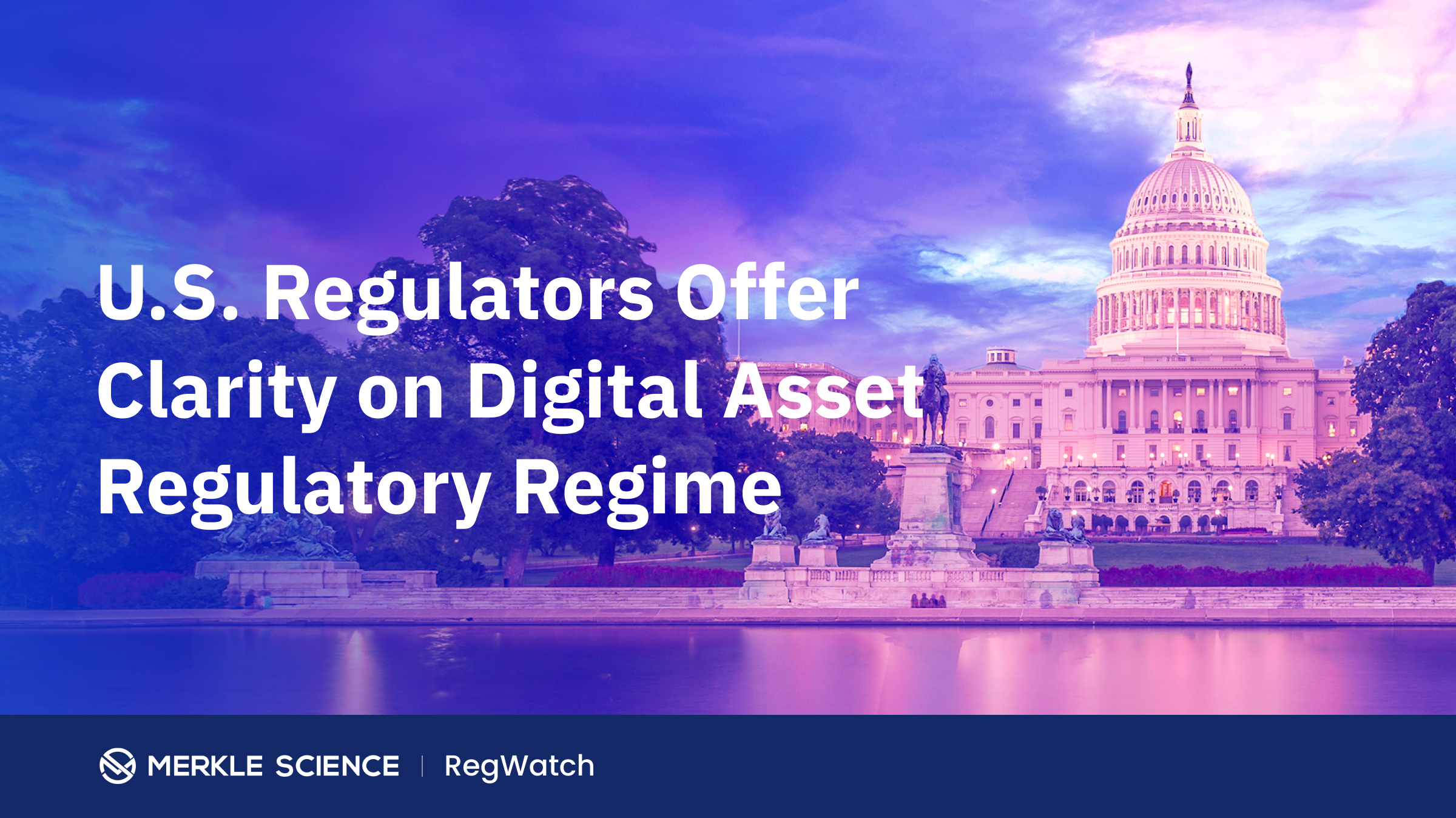U.S. Regulators Ramp Up Regulatory Oversight Over the Crypto Industry

Mary Beth Buchanan

Last week, the U.S. regulatory front attempted to address a long-standing desire from the industry for regulatory clarity. During a speech on 3 August 2021, at the Aspen Security Forum, the Securities Exchange Commission (SEC Chairman Gary Gensler outlined the approach that SEC may adopt to regulate the crypto industry. Keeping investor and consumer protection as his focal point, Gensler highlighted some of the concerns SEC had about DeFi platforms, stablecoins, exchange-traded funds (ETFS), crypto exchanges, and lending — and asked for resources from Congress to prevent transactions, products, and platforms from falling through regulatory cracks. This statement comes shortly after the introduction of the “Digital Asset Market Structure and Investor Protection Act” bill by Rep. Don Beyer (D-VA) on 28 July 2021. The bill, which is pegged to be the most comprehensive one to date lays down provisions that (a) regulate the categorization of digital assets, (b) desecuritization of tokens, and (c) allow the Department of Treasury to veto the creation of stablecoins amongst other measures. Further, on 1 August 2021, the senate proposed provisions on taxing digital assets in order to fund the Infrastructure Bill. The broadly worded definition of ‘broker’ in the bill has been a source of significant controversy, as the industry leaders believe it stifles innovation and investment in the crypto space.
Gensler’s Most Assertive Crypto Stance To Date
Gary Gensler’s statement during the Aspen Conference provided a lot more clarity to his approach as the head of the SEC, with a few key takeaways that industry players should pay heed to.
While Gensler highlighted that the mission of the SEC is to protect investors, facilitate capital formation, and main fair, orderly and efficient markets, his speech clearly indicated his focus on consumer protection. During his statement, he observed that “the American public is buying, selling, and lending crypto on these trading, lending, and DeFi platforms, and there are significant gaps in investor protection.”
Citing former SEC Chairman Jay Clayton’s speech in 2018, Gensler reiterated that most tokens are considered securities and should, therefore, fall under the jurisdiction of the SEC. To that end, Gensler honed in on crypto trading, lending, and DeFi platforms. He stated, “the probability is quite remote that, with 50 or 100 tokens, any given platform has zero securities” placing crypto-asset platforms on notice and warning them that they will most likely fall under the jurisdiction of the SEC.
Gensler also expressed concern over stablecoins and how the use of stablecoins is embedded in the crypto ecosystem. He elaborated: “The use of stablecoins on these platforms may facilitate those seeking to sidestep a host of public policy goals connected to our traditional banking and financial system: anti-money laundering, tax compliance, sanctions, and the like. This affects our national security, too.” However, Gensler seemed quite bullish on the chances of a Bitcoin ETF gaining approval from the SEC. He anticipates that many companies will file ETFs under the existing Investment Company Act 1940, which regulates mutual funds and closed-end funds, and provides significant investor protections.
Further, Gensler also requested for greater support and resources from Congress, highlighting that legislative priority should center on crypto trading, lending, and DeFi platforms as regulators try to pave the way for crypto to exist in a regulated, consumer-protected way.
Security or not? Comprehensive New Crypto Bill Looks to Define & Clarify
As per the provisions of Rep. Beyer’s new bill, the SEC and the Commodities Trading Future Commission (CFTC) would have to more clearly define which crypto assets would fall into the respective jurisdictions. In fact, these two agencies will be empowered to segregate the 25 most-traded cryptocurrencies and the 25 cryptocurrencies with the highest market capitalizations (so up to 50 total) into either securities or commodities.
The first section brings the digital asset securities under the oversight of the SEC. If passed, the bill would create a definition for “digital asset securities”, bring such securities under the purview of those provisions of the Securities Exchange Act, 1934 that lay down registration requirements applicable to digital asset securities and exemptions from such requirements.
Most importantly, Sec 103 of the bill lays down the provision for desecuritization. This provision explains how a token that is treated as digital security can become a cryptocurrency that will not be treated as a security. Once the SEC grants the Desecuritization Certificate, the requirement placed on a token to be registered as digital asset security is suspended. This reflects SEC Commissioner Hester Peirce’s longstanding efforts to create a safe harbor for crypto projects to get off the ground. According to the bill, the cryptocurrencies that don’t fall under the SEC’s jurisdiction will fall under the CFTC’s purview.
The bill gives insights into how the U.S. may regulate stablecoins. The bill accords the Treasury Department the power to veto the creation and usage of all stablecoins in the U.S. under its terms. This could create hurdles for issuers as the Treasury Department may restrict the trading of any and all stablecoins as they will need approval from the Treasury. It’ll be interesting to see how that is enforced, especially in relation to algorithmic stablecoins.
Further, the bill also requires FinCEN to issue rules that can potentially ban anonymizing services and anonymity enhanced tokens. This may mean that entities such as crypto exchanges will have to prohibit their customers from using services like coin mixers.
DeFi remains largely unaddressed. However, the bill places an obligation on the Federal Reserve, SEC, CFTC, Office of Comptroller of the Currency and the Treasury to submit a report summarizing DeFi in the U.S. and (among other things) provide recommendations regarding appropriate DeFi regulation & investor protection, & various legal obligations with regard to DeFi hacks, fraud, & manipulation.
Crypto Front and Center in the Bi-Partisan Infrastructure Bill
To help fund the $1 trillion bipartisan infrastructure bill, the Senate has proposed a provision that would impose stricter rules on how “digital assets” are taxed. This provision would require crypto “brokers” to report specific information about crypto transactions, like price points from when users bought in and sold. This will be in addition to reporting transactions of more than $10,000 to the IRS (which is already mandated).
The greatest point of concern for the crypto community was the definition of “broker”. Before the amendment, the bill defined a “broker” as “any person who (for consideration) is responsible for regularly providing any service effectuating transfers of digital assets on behalf of another person.”
This definition was considered to be too broad as it would target miners, developers, stakers, and others who do not have customers and hence have no access to the information needed to comply. Additionally, the language in the original bill also caused concern that it may push crypto businesses and trading overseas, potentially damaging blockchain innovation in the U.S. and its position in the global blockchain race.
Senators Pat Toomey, R-Pa.; Pat Toomey, R-Pa.; Kyrsten Sinema, D- Ariz.; and Cynthia Lummis, R-Wyo. introduced a compromise amendment to the bill which clarified that the term ‘broker’ does not apply to validators such as miners, stakers, or software developers. Therefore, the amendment clarifies that brokers only mean those persons who conduct transactions on exchanges where consumers buy, sell and trade digital assets. However, on 9th August 2021, due to the objection filed by Senator Richard Shely, the Senate did not vote unanimously and hence rejected the compromise amendment clarifying the definition of broker. The bill is expected to pass the Senate and will be then taken to the House of Representatives before it is made into law.
Why Merkle Science
Fuelled by the increased focus on consumer and investor protection, the U.S. regulatory bodies are looking to strengthen their crypto regulatory regime. Merkle Science’s highly customizable and easy-to-use platform provides near real-time detection of blockchain transactional risks Our predictive cryptocurrency risk and intelligence platform set the standard for the next generation of financial safeguards and criminal detection.
Merkle Science’s proprietary Behavioral Rule Engine allows crypto businesses to tailor the tool according to their risk policies based on the recent changes so that businesses may stay ahead of emerging illicit activities and fulfil their local compliance obligations.


